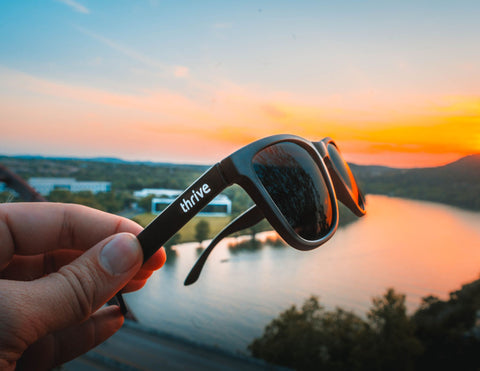
At its core, the term 'polarized' refers to a type of light filter. Light from the sun, or any other light source, scatters in all directions. However, when this light is reflected off certain surfaces like water or a shiny car hood, it becomes polarized.
This means that the light is more oriented in one direction, typically horizontally. The glare you see off of reflective surfaces is this horizontally polarized light.
Polarized lenses in sunglasses are designed to block this type of light. They have a special chemical film that acts as a filter to absorb horizontal light waves, while still allowing vertical light waves to pass through.
Essentially, they block the glare that can make it hard to see and can be potentially harmful to our eyes.
The Benefits of Polarized Sunglasses

Polarized sunglasses aren't just a trendy fashion statement; they offer numerous benefits for our eyes and overall visual comfort.
Enhanced Visual Comfort
The most immediate benefit you'll notice when wearing polarized sunglasses is the reduction in glare. This means that the bright, often blinding light reflected off surfaces won't reach your eyes.
This feature greatly improves comfort, especially during outdoor activities like driving, boating, or skiing, where glare can cause discomfort and even temporary blindness.
Improved Visual Clarity and Contrast
By blocking intense reflected light, polarized lenses allow the details of your environment to come forward.
Colors appear more vivid, and contrast is heightened. Whether you're admiring the scenery on a hike or keeping a watchful eye on the road, polarized sunglasses allow you to take in your surroundings with enhanced clarity.
Eye Health Protection
Prolonged exposure to intense glare can cause harm to your eyes, potentially leading to conditions such as cataracts and macular degeneration over time. By reducing exposure to harsh light and glare, polarized sunglasses can contribute to the long-term health of your eyes.
Testing Your Sunglasses for Polarization

Curious about whether your sunglasses are polarized? There's a simple test you can perform at home, known as the 'polarized sunglasses test'.
Hold your sunglasses up and look at a reflective surface through one lens. Then, rotate the sunglasses 90 degrees.
If the glare becomes brighter and then dims again as you rotate them, your sunglasses are polarized. This change in brightness occurs because the polarizing filter in the lens is oriented differently from the reflected light at different angles.
Polaroid Glasses - A Misnomer?
When people talk about 'Polaroid glasses', they're usually referring to polarized sunglasses. However, it's important to note that Polaroid is actually a brand that became famous for its polarized sunglasses and camera lenses, among other things.
The term 'Polaroid glasses' has since been colloquially used to mean any sunglasses with polarized lenses, much in the same way that some people use 'Kleenex' to refer to any brand of tissue.
The Flip Side: Disadvantages of Polarized Sunglasses
Despite the undeniable benefits, polarized sunglasses aren't without drawbacks. For example, they can make it challenging to see LCD screens, which can be inconvenient if you rely on digital devices or dashboards.
They can also react negatively to certain tints on windshields, which might make them less suitable for driving. In low-light situations and at night, the darkened lenses can reduce visibility, which can be dangerous, particularly for those already having trouble seeing in such conditions.
Alternatives to Polarized Sunglasses

If for some reason you find polarized glasses uncomfortable or unsuitable for your needs, there are alternatives available.
These include sunglasses with an anti-reflective coating, mirrored sunglasses that decrease the amount of light entering your eyes, and photochromic lenses that automatically darken when exposed to a certain amount of light.
Polarized Lenses vs. UV Protection: What's the Difference?
While polarized lenses effectively reduce glare, it's important to remember that they do not inherently provide UV protection. UV-protected lenses, on the other hand, shield your eyes against harmful UV exposure, which is linked to eye conditions such as cataracts and temporary blindness, or photokeratitis.
To get the best of both worlds, look for sunglasses that are both polarized and offer UV protection. Many polarized sunglasses on the market include a UV protection coating, but it's always wise to read the tags when shopping for a new pair.
Identifying Polarized Sunglasses
Identifying polarized sunglasses is relatively straightforward. One method is by looking at a reflective surface both with and without the lenses.
Polarized lenses should make it easier to see things clearly in bright light. Alternatively, you can check by looking at an LCD screen, as polarization often makes screens appear black or very dark.
Polarized Sunglasses by The Shades Hut
These are a list of few of the best sunglasses on available on our website for more models contact us or browse our website.
- OAKLEY CRANKSHAFT SUNGLASSES BLACK IRIDIUM POLARIZED LENS OO9239-06
- GUCCI ROUND WOMEN'S SUNGLASSES W/BLUE POLARIZED LENS GG0061S-004
- OAKLEY OO9359 08 PRIZM BLACK POLARIZED LENS MEN'S SUNGLASSES
- RAY-BAN SUNGLASSES BLACK W/GREEN CLASSIC G-15 POLARIZED LENS
- MIU MIU SUNGLASSES MU57TS 1ABOA7 BLACK GOLD/GREY GRADIENT POLARIZED
Conclusion: The Polarized Perspective
Polarized sunglasses are much more than a stylish accessory. They are a useful tool for enhancing visual comfort and protection against glare, especially in high-glare environments. While they have their disadvantages and aren't suitable for all situations, the benefits they offer make them an essential item in your outdoor gear.
As with any eyewear, your choice should ultimately depend on your specific needs and lifestyle. So, whether you're an avid angler, a weekend hiker, or a beach lover, polarized sunglasses might just be the vision-enhancing solution you've been looking for.
Leave a comment









